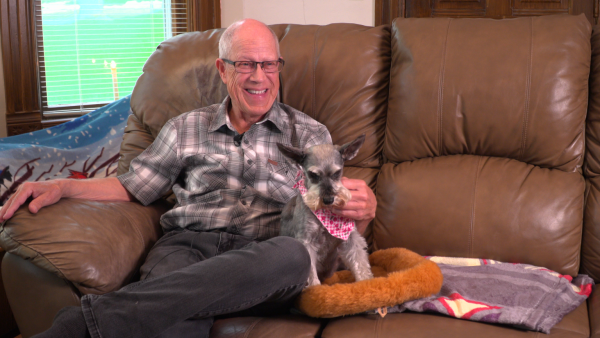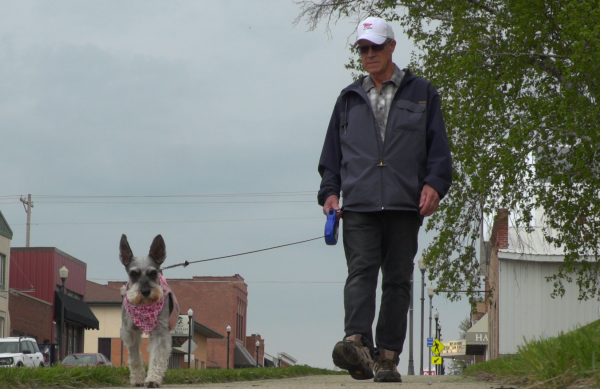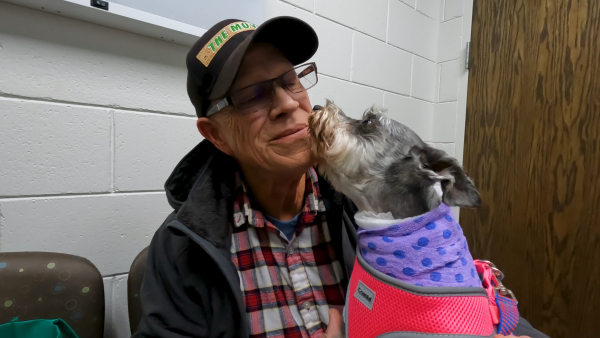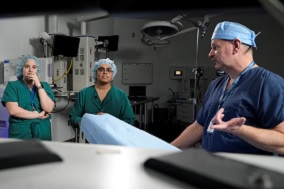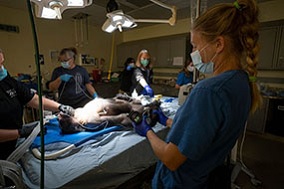Pets and pacemakers: best friends a while longer
Tara, a miniature schnauzer, received a donated Medtronic pacemaker to treat her life-threatening heart condition
Richard Berg’s heart ached as he watched what was happening to his beloved Tara, a 12-year-old miniature schnauzer he adopted as a puppy.
“She would suddenly start to wobble and then faint and fall over,” he remembered. “It was so hard to see. She’s my best friend. I thought for sure I was going to lose her.”
Tara is a 12-year-old miniature schnauzer.
Tara’s veterinarian diagnosed her with Sick Sinus Syndrome (SSS), a disease in which the heart’s natural pacemaker malfunctions and no longer generates normal heartbeats. SSS is common in many animals; people suffer from it, too. Just as in humans, there’s an effective treatment.
“The veterinarian said ideally Tara should get a pacemaker,” Richard said. “And I said ‘What? Really? I didn’t know that was even possible.’”
During a 90-minute surgery, veterinary cardiologists at the University of Minnesota implanted a Medtronic pacemaker behind Tara’s right shoulder, threading the device wires, or leads, through a vein and into the right ventricle of her heart.
“Tara’s prognosis is excellent,” said Dr. Allison Masters, a veterinary cardiologist at the University of Minnesota College of Veterinary Medicine who supervised Tara’s procedure. “The device will sense when Tara’s heart malfunctions and will take over. The fainting should stop, and this condition should not really affect Tara again for the rest of her life.”
Medtronic donated Tara’s pacemaker through a nationwide nonprofit called CanPacers. It’s a medical device repository sponsored by the American College of Veterinary Internal Medicine and maintained at North Carolina State University.
Its mission is to provide cardiac pacemakers and leads to veterinary patients. Medical device companies donate the devices, which were originally intended for human patients, and CanPacers oversees distribution to veterinary cardiology programs around the United States.
“Medtronic donates more than 90% of our inventory,” said Dr. Sandra Tou, a veterinary cardiologist at the North Carolina State College of Veterinary Medicine, who coordinates the CanPacers program. “Their participation is absolutely essential to our operation. Medtronic donates as many as 300 pacemakers a year to CanPacers, but there’s a growing unmet need. We currently have a waiting list of more than 100 pet hospitals waiting for a pacemaker.”
Demand for pacemakers in pets is increasing as more pet owners learn that such options are available, Dr. Tou said. And it’s not just pacemakers. Veterinary cardiologists are increasingly performing other life-saving cardiac procedures that physicians use for human patients, said Dr. Chris Stauthammer, Vice-Chair for the Department of Veterinary Clinical Sciences and Professor of Veterinary Cardiology at the University of Minnesota College of Veterinary Medicine. “We repair holes in hearts and do a lot of stenting in arteries, as well as implant pacemakers. And we recently implanted a Medtronic heart valve to treat a case of pulmonary stenosis. We couldn’t do that without the Medtronic donation and their support expertise,” he said.
“I feel strongly that all the advances we’re seeing in human medical cardiology will eventually translate to veterinary medicine,” added Dr. Masters.
In addition to devices, Medtronic has also provided support staff in some cases to help with device programming and placement during veterinary surgeries. The company also regularly opens its research doors to veterinary cardiologists to keep up with trends in human heart technology.
“By providing some of the same treatment options for animals as we do for humans, we continue to fulfill the Medtronic Mission – to alleviate pain, restore health, and extend life. Many of the therapies used in humans can also help animal patients, and being able to bridge that gap into veterinary medicine is truly rewarding,” said Dr. Jessi Coryell of the Medtronic Physiological Research Lab.
After six weeks of veterinarian-ordered non-activity, Tara is back to her normal rambunctious self. She’s playing with her favorite toys, jumping on and off beds and sofas, and taking Richard on long walks around town.
There’s a small bump behind her shoulder, where the pacemaker constantly senses her level of physical activity and increases or decreases her heartbeats accordingly. There are no signs of the fainting spells that threatened her life just a few weeks earlier.
Tara and Richard are going to be best friends for a while longer.
“What a wonderful thing for Medtronic to donate these pacemakers,” Richard said. “And I’m so thankful to the doctors for returning Tara to good health. I don’t know what I would do without her.”
L001-06122023
Related content


